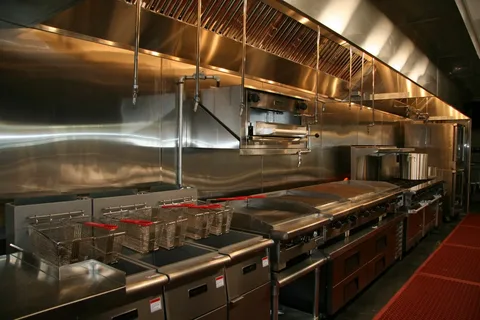Keeping your kitchen clean means more than just wiping countertops and washing dishes. One of the most overlooked areas in many homes is the range hood. Regular kitchen exhaust hood cleaning is essential not only for hygiene but also for fire safety and maintaining proper air quality.
If you’re living in Charleston, SC, where humidity can lead to quicker grease buildup, it’s even more important to stay on top of kitchen vent maintenance. This guide will walk you through four simple steps to deep clean your range hood and vent effectively.
Remove and Soak the Filters
Start by turning off power to the hood. Most range hood filters simply slide or pop out from underneath the unit. Fill a sink or basin with hot water, a few drops of dish soap, and about 1/4 cup of baking soda. Submerge the filters and let them soak for 15–20 minutes to loosen grease.
Once soaked, scrub the filters with a brush to remove any remaining residue. Rinse and allow them to dry completely before reinserting them.
Clean the Hood Surface
Use a degreasing cleaner or a mixture of vinegar and warm water to wipe down the entire exterior of the hood. Focus on areas around the edges and buttons, as these are hotspots for grime and fingerprints. For stainless steel surfaces, use a microfiber cloth and wipe with the grain to avoid scratching.
Degrease the Interior and Fan
The inside of your range hood — especially around the fan — collects a lot of grease over time. Spray the interior with a kitchen-safe degreaser and let it sit for a few minutes. Then wipe thoroughly with a cloth. Be cautious around electrical components. If your model allows, remove the fan cover and clean it separately.
Reassemble and Test
Once all parts are dry and clean, reassemble the hood. Plug it back in or turn on the breaker. Run the fan for a few minutes to ensure everything is working properly. Regular cleaning will help maintain airflow and reduce the chance of fire hazards caused by grease buildup.
Why Professional Cleaning Matters
DIY cleaning is helpful, but over time, vents and ductwork connected to your hood can become heavily clogged with grease and grime. That’s when it’s best to call a professional. Experts like SC Soft Wash Pros offer deep kitchen exhaust cleaning services that go beyond surface-level scrubbing, ensuring your entire ventilation system is safe and efficient.
Final Thoughts
Routine kitchen exhaust hood cleaning should be part of every homeowner’s maintenance schedule. It improves kitchen air quality, helps appliances last longer, and reduces fire risks. In humid environments like Charleston, SC, regular cleanings are even more critical. With just a few easy steps — or help from a local expert — you can keep your kitchen cleaner, healthier, and safer.
Frequently Asked Questions
1. How often should I clean my kitchen range hood?
You should clean the filters monthly and do a full deep clean every 3–6 months, depending on cooking habits.
2. Can I put range hood filters in the dishwasher?
Yes, most metal filters are dishwasher-safe. Check the manufacturer’s instructions first.
3. What happens if I don’t clean my range hood?
Grease buildup can cause poor ventilation, odors, and even fire hazards over time.
4. How do I know if my vent system needs professional cleaning?
If you notice strong odors, visible grease buildup, or poor fan performance, it’s time to call a pro.
5. Is it safe to clean the fan by myself?
Light surface cleaning is safe, but for deep fan or duct cleaning, it’s best to hire a trained technician.



